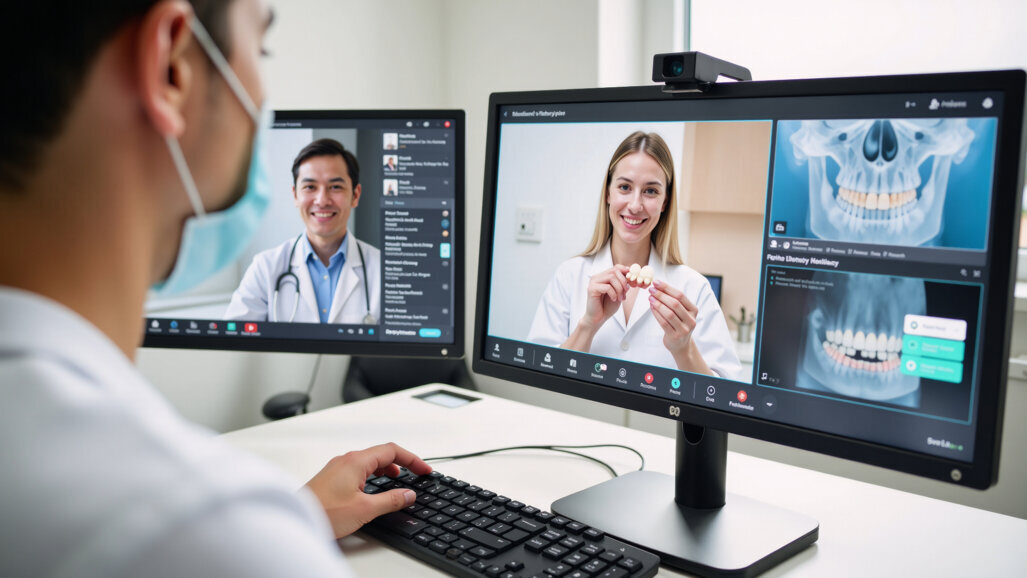JAKARTA, Indonesia: A large-scale teledentistry initiative in Indonesia has helped people brush more frequently and improved oral health awareness, according to new research. However, the study warns that digital consultations alone may not be enough to boost individuals’ confidence in managing their own oral health or to sustain long-term oral health improvements.
Conceived and undertaken by an international research team, the study evaluated Unilever’s Pepsodent “talk to a dentist” programme, which allows Indonesians to connect with qualified dentists through WhatsApp by scanning a QR code on toothpaste packaging. The initiative forms part of efforts to expand dental access across Indonesia’s 17,000 islands, where geography and costs continue to limit in-person care.
The researchers compared 300 users of the service with a demographically matched control group. The findings showed that users brushed an average of 1.06 times more per week and for slightly longer than before. They also reported fewer difficulties with chewing and speech, and almost two-thirds said that they intended to visit the dentist more frequently.
Dentists participating in the qualitative arm of the study described the platform as a useful bridge between self-care and professional treatment and noted that it helped reduce dental anxiety and made consultations more flexible. However, there were also technical and operational challenges, including long onboarding times, limited image quality for diagnosis, prank users, and uneven digital literacy among both patients and practitioners.
Despite the behavioural gains reported, users self-rated oral health status and perceived control over their oral health declined slightly. The researchers suggest that these findings may reflect increased awareness of unresolved dental issues. The authors concluded that while teledentistry can successfully promote preventive habits, its lasting impact depends on integration with in-person care and continued professional support.
The study, titled “Leveraging digital innovations for universal oral health coverage: Evaluation of a teledentistry programme among Indonesian adults”, was published online on 3 October 2025 in BMC Oral Health.
Topics:
Tags:
GIESSEN, Germany: To expand access to paediatric care beyond the traditional clinical setting, the application of asynchronous teledentistry is gaining ...
JAKARTA, Indonesia: Teledentistry consultations are expected to increase after the Ministry of Health of Indonesia and the Indonesian Dental Association ...
LONDON, UK: The British Orthodontic Society (BOS) has recently released guidance on teledentistry and remote interactions in orthodontic care. By offering ...
LOS ANGELES, U.S.: Consumers in California who receive treatment from teledentistry providers will be afforded new protection from January 2020. Crucially, ...
Held just recently in September, the inaugural event of the Indonesia Dental Exhibition and Conference (IDEC) proved an all-round success. For many ...
Live webinar
Tue. 3 March 2026
8:00 pm EST (New York)
Dr. Vasiliki Maseli DDS, MS, EdM
Live webinar
Wed. 4 March 2026
12:00 pm EST (New York)
Munther Sulieman LDS RCS (Eng) BDS (Lond) MSc PhD
Live webinar
Wed. 4 March 2026
1:00 pm EST (New York)
Live webinar
Wed. 4 March 2026
8:30 pm EST (New York)
Lancette VanGuilder BS, RDH, PHEDH, CEAS, FADHA
Live webinar
Fri. 6 March 2026
3:00 am EST (New York)
Live webinar
Tue. 10 March 2026
4:00 am EST (New York)
Assoc. Prof. Aaron Davis, Prof. Sarah Baker
Live webinar
Tue. 10 March 2026
8:00 pm EST (New York)
Dr. Vasiliki Maseli DDS, MS, EdM



 Austria / Österreich
Austria / Österreich
 Bosnia and Herzegovina / Босна и Херцеговина
Bosnia and Herzegovina / Босна и Херцеговина
 Bulgaria / България
Bulgaria / България
 Croatia / Hrvatska
Croatia / Hrvatska
 Czech Republic & Slovakia / Česká republika & Slovensko
Czech Republic & Slovakia / Česká republika & Slovensko
 France / France
France / France
 Germany / Deutschland
Germany / Deutschland
 Greece / ΕΛΛΑΔΑ
Greece / ΕΛΛΑΔΑ
 Hungary / Hungary
Hungary / Hungary
 Italy / Italia
Italy / Italia
 Netherlands / Nederland
Netherlands / Nederland
 Nordic / Nordic
Nordic / Nordic
 Poland / Polska
Poland / Polska
 Portugal / Portugal
Portugal / Portugal
 Romania & Moldova / România & Moldova
Romania & Moldova / România & Moldova
 Slovenia / Slovenija
Slovenia / Slovenija
 Serbia & Montenegro / Србија и Црна Гора
Serbia & Montenegro / Србија и Црна Гора
 Spain / España
Spain / España
 Switzerland / Schweiz
Switzerland / Schweiz
 Turkey / Türkiye
Turkey / Türkiye
 UK & Ireland / UK & Ireland
UK & Ireland / UK & Ireland
 Brazil / Brasil
Brazil / Brasil
 Canada / Canada
Canada / Canada
 Latin America / Latinoamérica
Latin America / Latinoamérica
 USA / USA
USA / USA
 China / 中国
China / 中国
 India / भारत गणराज्य
India / भारत गणराज्य
 Pakistan / Pākistān
Pakistan / Pākistān
 Vietnam / Việt Nam
Vietnam / Việt Nam
 ASEAN / ASEAN
ASEAN / ASEAN
 Israel / מְדִינַת יִשְׂרָאֵל
Israel / מְדִינַת יִשְׂרָאֵל
 Algeria, Morocco & Tunisia / الجزائر والمغرب وتونس
Algeria, Morocco & Tunisia / الجزائر والمغرب وتونس
 Middle East / Middle East
Middle East / Middle East






































To post a reply please login or register